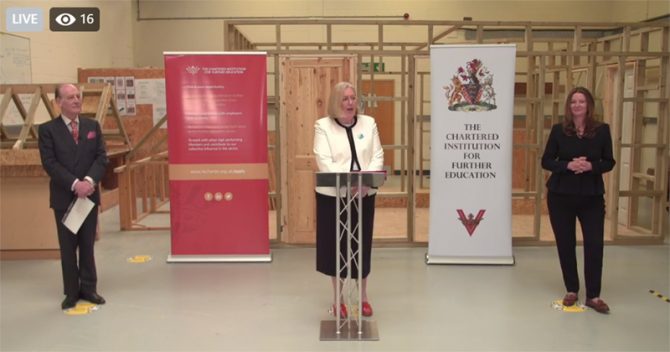“If you are funded by government, you can’t use your voice in the same way, you’re influenced in a certain way,” says deputy chair Dawn Ward as she describes the “importance” of the Chartered Institution for Further Education (CIFE) becoming independent.
Supported by former skills minister John Hayes in 2013 to grant chartered status to FE providers, the institution was subsidised by the Department for Education to the tune of £1.7 million before financial support ended in 2019.
At that point its first chief executive, Dan Wright, stood down and with no replacement appointed, responsibility for running the institution fell to its council.
The body has since undertaken a “strategic review”, led by former college principal and independent council member Lesley Davies, who devised a plan for the institution to be self-sustaining for an “exciting new chapter”.
Speaking exclusively to FE Week, Ward, who has played a leading role at the institution since its conception, alongside her job as principal of Burton and South Derbyshire College, says that now the Covid-19 pandemic is easing, it is ready to officially “relaunch”.
Key to its operation going forward will be funding from industry to conduct research that “enables us to use our unified voice to influence at the highest levels of government and to collaborate and share best practice”.
Its first report, which was funded by property company St Modwen Homes and focused on the “importance of securing future skills” for the construction industry, launched this week on Thursday at London South East Colleges group at an event attended by skills minister Gillian Keegan.

The institution has several other potential research projects in the works, including in the hospitality sector, that they hope to launch over the next year.
Awarding of associate fellowships will also be key new feature of the CIFE.
In previous years, the institution has handed out a number of honorary fellowships, with recipients including Ann Limb, Sir Geoff Hall, Sir John Hayes, David Sherlock and Chris Humphries.
Ward says associate fellows are the “norm” in higher education and their introduction to the FE sector will help “better recognise the professional status of the many FE industry specialists”.
Individuals, such as college and training provider leaders and chairs, will be able to apply for the associate fellowships but will have to demonstrate they meet the criteria of a new framework.
The framework is currently being piloted with three members and five non-members to ensure it fits “what the sector needs”.
Ward explained that the framework has a “particular focus” on “dual professionalism” and it will “recognise the industrial updating of technical and professional educators in FE”.
Ward explains: “The pilot is now looking at what is needed to be put in place to recognise associate fellows, so what evidence will we need.
“So it’s not just about saying, tick, somebody has been into industry for a week, it will be looking at what evidence will they need within a framework to evidence that there has been an impact of what they’ve done. It will include a reflective piece.”
Ward said that both these elements – industry research and associate fellowships – will be “key features of the relaunched, independent Institution and will support the charter’s mission to raise recognition and esteem of FE within the wider education sector”.
Growing membership of providers with chartered status will also be key to the institution’s sustainability.
At Thursday’s construction report launch, chair of the institution Lord Lingfield said one of his top priorities is to become known as the “Russell Group of FE – a group of the most distinguished colleges and providers in the country”.
It currently has 15 members, who pay an annual subscription fee of £5,000. The latest member to join was the TEC Partnership, in summer 2019.
Ward says the institution has a number of other FE providers “looking to apply this year”. Interested parties must pay a £3,000 non-refundable fee to have an application reviewed.
The institution’s former chief executive, Dan Wright, previously said that it would need around 80 members in order to continue without government subsidy.
But with income now expected to also come from industry, the institution isn’t setting a membership target.
“Part of our business plan is obviously about growing membership. But in the same way, if you go back to when 157 Group started years ago, it’s not about having set targets, it’s about that evolution as it goes through,” Ward said.

“What’s really important is that we grow the value that we give.”
But Ward is hopeful that “every” college and FE training provider can achieve chartered status: “You have chartered engineers and accountants, it means something to industry, so it is really, really important for FE.”
The institution’s council is currently led by chair Lord Lingfield and deputy chair Ward. It is made up of nine other council members and has undergone a bit of a refresh over the past year.
New appointments include London South East Colleges chief executive Sam Parrett, Burton and South Derbyshire College governor Rajinder Mann, Working Men’s College principal Helen Hammond and Hawk Training managing director Crawford Knott.
But while the institution is being run by the council at the moment, with the assistance of a secretariat, Ward says they are looking to appoint a new chief executive to replace Wright. “Our plan is to grow incrementally, and we will look to appoint somebody to take us forward on the next steps,” Ward said.
“That will be about growing our strategies as an independent charter that has been developed by the new council.”
The institution is not planning a physical relaunch, but says it will announce further detail on its plans going forward in July, once its next council meeting has taken place.
They will also be holding another admissions and fellowship ceremony at some point, once applications have been reviewed and Covid restrictions allow.




